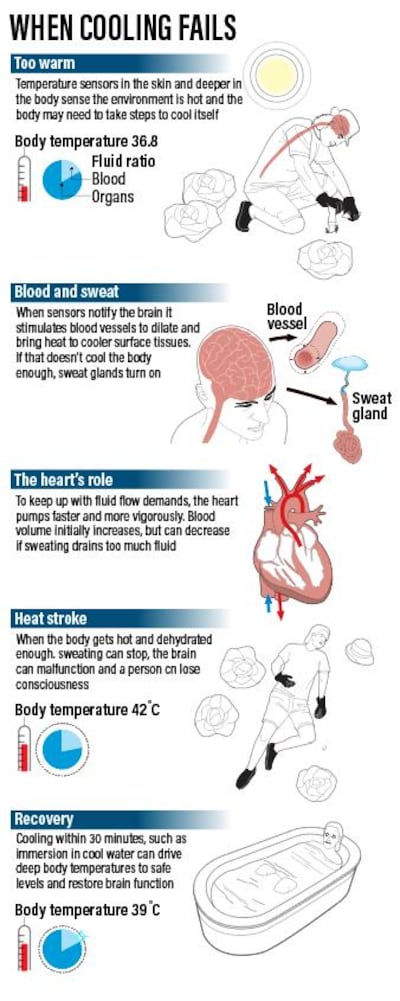Soaring daytime temperatures have brought an early start to the UAE summer – and with it comes a warning about exercising safely in the heat.
Average temperatures for May are about 31°C, but desert winds from the south pushed the mercury closer to 40°C for much of the month.
Temperatures were above 49°C in one area of Dubai on Sunday.
Such temperatures can lead to heatstroke, say doctors.
But despite sweltering days, health professionals said exercise programmes could continue safely and offered advice to those working and playing outside.
“Heat fatigue, exhaustion or stroke are issues that can arise, particularly in anyone not used to these really high temperatures,” said Dr Mohamed Muthiullah, a consultant cardiologist at Burjeel Hospital for advanced surgery in Dubai.
“It can increase the load placed in the heart as the body tries to cool down in the heat, and this can cause potential problems, so we need to be careful.”
When the human body reacts to heat stress, it works significantly harder to retain a core temperature of about 37°C.
The nervous system responds to high temperatures, with internal sensors asking the brain to dilate blood vessels, causing more blood to circulate and lose heat.
If external air is warmer than body temperature, sweat glands aid the process.
An active person can easily sweat out two litres of water an hour, with hands and torso the most concentrated areas.
If the body temperature rises to 44°C, the brain falters, causing confusion, agitation, slurred speech and, in extreme cases, coma.
“Heat-related illnesses are largely preventable, so exercise routines don’t have to be sidelined when the heat is on,” said Dr Muthiullah.
“We should keep in mind rising temperatures, get acclimatised and keep an eye on any weather alerts.
“A golden rule is if you are used to exercising indoors or in cooler climates, then take it easy.
“It will usually take 10 days to two weeks to acclimatise to the hotter weather, and then gradually we can slowly increase intensity at cooler times of the day.”
Read More
Dubai's UFC Gym's 'fight club' draws in new batch of recruits looking to get fit
HI-YAH! Inside the UAE's booming martial arts scene
Egyptian brothers to take on cycling world with Dh60,000 bike as Ventum launches in Dubai
A decade-long study in 2010 by the US Centres for Disease Control and Prevention recorded 8,081 heat related deaths across America, with a third of victims aged 65 and above.
A heatwave in France in 2003 resulted in 15,000 deaths in little more than a fortnight. Most victims were elderly or overweight.
In March, a young Australian soldier died days after collapsing during a training exercise in Darwin, one of the country’s hottest cities.
Dehydration adds to heat stress and risk of serious injury, so staying hydrated offers some protection but cannot guard against overheating.
Doctors said cooling the body with ice packs or cold water was an effective way to reduce core temperature during and after a workout.
“During exercise, a temperature increase of 1-1.8 degrees Celsius occurs every five minutes,” said Dr Mehmet Urumdas, a cardiologist at NMC Royal Hospital, Dubai.
“If this heat cannot be lost through sweating and the respiratory system, problems arise.”
Drinking cold water can contribute to temperature regulation.
Dr Urumdas said anyone exercising in the heat should drink 400-600 millilitres of water 30 minutes before exercise, and 100-200ml of water every 10 to 15 minutes during activity.
“The efficiency of sweating to regulate temperature during exercise in an environment with high humidity is low,” he said.
“The higher the humidity, the harder it is for the body to lose heat.”
Outdoor workers are most at risk from heat exhaustion in the UAE, with restriction on labour hours due to begin this month to protect the most vulnerable during the hottest part of the day.
In the US, construction workers are 13 times more likely to die from heat than other workers in extreme weather.
The number of unsafe outdoor working days are expected to double by 2050 in the US, according to environmental research.
The International Labour Organisation predicts heat exposure will threaten the health of an estimated 4 billion workers by 2100, causing a 2.2 per cent dent in productive working hours.
With much of the global population ageing and getting heavier, doctors are predicting more heat-related illness in the future.
“If the body temperature does not have time to acclimatise to an increase in environmental heat there can be serious health consequences, particularly during physical exertion,” said Dr Gaurav Prakash Singh, an expert in sports injuries at International Modern Hospital, Dubai.
“Moderate exercise in the heat can improve blood flow, which improves body cooling and help us to adapt to the hotter weather we are seeing now.
“But older people and those who are overweight or obese must take extra care in the heat, as they are more vulnerable to heat related health problems."







